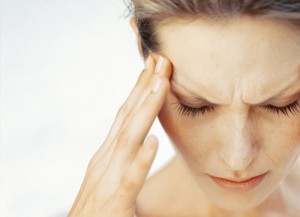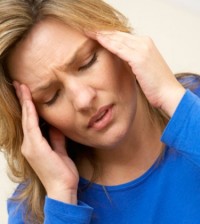 Tension headaches and migraines are both considered types of headaches; with tension headaches being the most common.
Tension headaches and migraines are both considered types of headaches; with tension headaches being the most common.
The most frequent reason for a tension head ache is muscle tension and is generally associated with postural problems. Tension headaches tend to be caused by stress, exhaustion, noise and eye strain. Tension headaches are frequently linked to disk problems or degenrative bone disease within the neck or spinal column.
A migraine headache or vascular headache is known by a throbbing or pulsating pain. Migraine headaches are often incapacitating and are associated with nausea or vomiting, disrupted sleep, pain in the neck and head area, sensitivity to light, sound and certain odors. Certain foods, like aged cheese and red wine, can trigger headaches and migraines, so take a look at what you are eating. An easy way to track potential trigger foods is to start a food journal.
Your headache may be a migraine if you have a combination of these symptoms:
- Moderate to severe pain
- Sensitivity to light, noise or odors
- Blurred vision
- Nausea or vomiting
- Loss of appetite
- Sensations of being very warm or cold
- Fatigue or Dizziness
- flashing dots or lights
If you think your headache might be a migraine, please see a health care practitioner for your treatment options. You want to make sure that you have your neck and upper and lower back checked by your health care practitioner to rule out any structural causes caused by tightened muscles in the the neck and back regions.
Sometimes headaches can signal a more serious problem. You should talk to your health care practitioner about your headaches if…
- You have several headaches per month
- You have nausea, vomiting, vision, or suffer from numbness or tingling
- You have a severe headache with a stiff neck or pain around the eye or ear
- You have a headache with confusion, loss of alertness or loss of speech
- You have a headache after a blow to the head
- You used to be headache-free, but now experience frequent headaches
“Although the exact cause of migraine headaches isn’t completely understood, medical researchers believe that migraine headaches are caused by altered blood flow and abnormal levels of naturally produced substances in the brain. When blood flow is decreased, certain arteries dilate and cause pain producing chemicals to be released. Additionally, the dilation causes an increase in the natural substance levels. This makes the blood vessels lining the brain swell and creates pressure on nearby nerves. These nerves send pain signals to the body that are typically felt around the eye or temple region and can extend to the face, sinus, jaw, or neck.“
A health care practitioner can determine if your headache is a migraine, and can prescribe the best treatment option – Chiropractic, Acupuncture or Physiotherapy for your unique symptoms.


 In Autumn, we observe nature withdrawing inward. We see leaves wither on the branch as the trees gather energy inward and down to the deep center and roots to protect and guard vitality, like a precious secret, throughout the winter months.
In Autumn, we observe nature withdrawing inward. We see leaves wither on the branch as the trees gather energy inward and down to the deep center and roots to protect and guard vitality, like a precious secret, throughout the winter months. In her book, The Women’s Migraine Survival Guide, Christina Peterson, M.D., offers some advice on an array of migraine triggers that women (and men too!) with chronic migraines should learn about and avoid. Here are the most common:
In her book, The Women’s Migraine Survival Guide, Christina Peterson, M.D., offers some advice on an array of migraine triggers that women (and men too!) with chronic migraines should learn about and avoid. Here are the most common:
